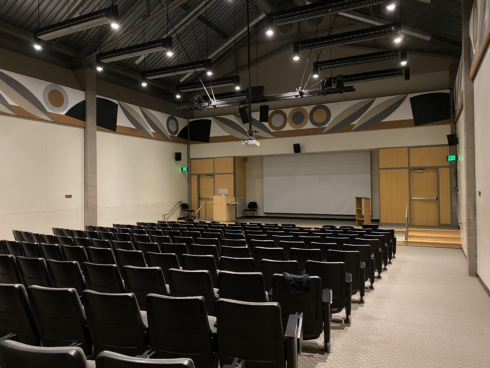
Students in support of a campaign to permanently stop construction of the Jordan Cove Liquified Natural Gas Pipeline across Southern Oregon rallied in front of the Stevenson Union on Wednesday. Since the campaign was initiated last term by the Oregon Student Public Interest Research Group (OSPIRG) volunteers have been tasked with collecting petition signatures, calling state legislatures and sending letters to the Federal Energy Regulatory Commission (FERC) while encouraging other students to do the same.
“We don’t have enough money or resources to overpower these corporations so we need the people power to do it,” said Lindsey Rocha, Vice Chair of OSPIRG. According to Rocha the group set a goal to reach 800 signatures by week three of spring term, which was easily surpassed, as they expected to reach 1,000 by the end of the day. University of Oregon’s OSPIRG group has also joined the campaign since its creation.
“Don’t just put a poster up in your yard. Don’t just post something on Facebook. Call your senators. Call someone that can really get this done,” said Rachel Rose Sheldon, Miss Jackson County and SOU student. “Put yourself out there and make change happen.”

While speaking to a crowd of students Sheldon recalled the first time she saw a Jordan Cove employee measuring her family’s property in Coos Bay, Oregon, in preparation for the pipeline. “Imagine how I felt to see a man that I had never met measuring our property. When I asked him about it he calmly told me that my house and my land was going to be cut in half.” According to Sheldon 704 individual homeowners will be affected by a pipeline she views as a “get rich quick scheme.”
“We’re the next generation, we’re the ones that are going to be making the next big decisions later on and we need to start now,” said Morgan Bechtold-Enge, OSPIRG Chapter Chair and pipeline campaign coordinator. Bechtold emphasized the importance of calling state legislatures in order to spark a change. “If we have our state legislators behind us on this then we are able to say no to this pipeline.”

“Calling your representatives definitely makes an impact,” said SOU student Deanna Mulaskey. “Even if you don’t always get through to someone, the number of people calling will add up.”
Though a previous application for the pipeline, set to carry LNG to a plant north of Coos Bay for export overseas, was denied by FERC, the federal commission approved a pre-filing application in February, allowing the project to move forward through the federal permitting process. The multi-billion dollar project proposes apipeline that will run northwest from Malin, Oregon to the Jordan Cove LNG facility in Coos Bay, cutting through Jackson county along the way.
Of the 233 miles it is set to run, 40 percent will cut across private property, 30 percent would cross commercial timber land, and the other 30 percent would cross federal land.
“This is not coming through my state,” said Bechtold who has lived in the Rogue Valley her entire life. “This is not going to be cutting through my Rogue River. I won’t stand for it.”



